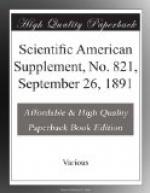M. De St. Germain achieved good results by combining judicious exercise with moderate alimentation, excluding wine and bread.
M. Dujardin Beaumetz, who professes to have given most close and careful study and attention to regimen for the obese, outlines the following, provided there is no evidence of fatty degeneration of heart.
Breakfast (at 8 a. m.)—Three-fourths of an ounce of bread “en flute”—that is abounding with crust; one and a half ounces of cold meat, ham or beef, six ounces weak black tea, sans sugar.
Lunch (at 1 p.m.)—An ounce and a half to two ounces of bread, or a ragout, or two eggs; three ounces green vegetables; one-half ounce of cheese; fruits at discretion.
Dinner (at 7 p.m.)—An ounce and a half to two ounces of bread; three to four ounces of meat, or ragout; ditto of green vegetables, salad, half an ounce of cheese, fruit ad libitum.
At meal times the patient may take only a “glass and a half” of liquid—approximately ten ounces—though a greater amount may be permitted if he abstains during the intervals.
Special alimentary regimen, however, does not constitute the sole treatment of obesity. Concurrently must be employed a number of practical adjuvants which are oftentimes of the utmost assistance. For one thing, exercise is indispensable; all authorities agree on this point. The exercise taken in the gymnasium is one of the best, notably the “wall exercise,” which is more particularly suited to those afflicted with pendulous and protuberant abdomens as the result of feebleness of the hypogastric muscles, to accumulation of fat under the skin and in the omentum, and to dilation of the stomach and intestines. In the “wall exercise,” the patient stands erect against an absolutely straight and plumb wall, lifts his hands (carrying a weight) straight over the head, and causes them to describe a semicircle forward. Zantz particularly insists upon arm and leg exercise for the obese, especially the former, since with the same amount of effort a larger amount of oxygen is consumed than is possible by the latter.
However, of whatever character, the exercise should be continued to the point of fatigue or dyspnoea—three thousand movements daily, gradually increased to twenty-five thousand, if the system can bear it; and under such conditions, not only is there consumption of hydrocarbons, but there is provided a veritable greed for air that augments waste. The experiments of Oertel indicate that loss of weight due to fatiguing exercise arises more particularly from dehydration, which is made good by absorption of the fluids employed as beverage; the fluids are claimed by Germain See to act as accelerants of oxidation.




